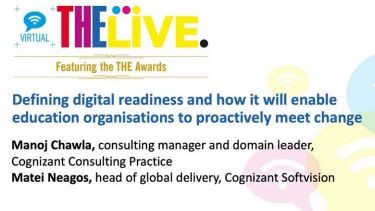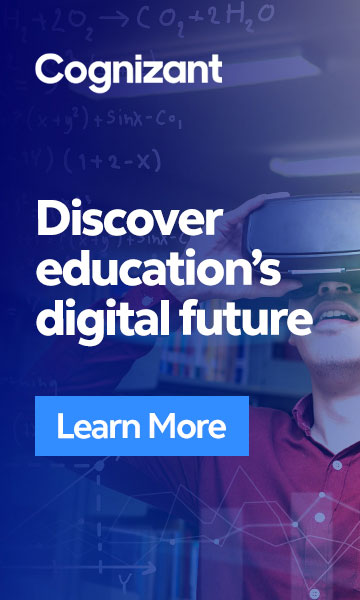
Putting students at the centre of decision-making can save higher education leaders time and money, and create a better learning experience
As originators of knowledge, universities should be at the forefront of technological developments. But the Covid-19 pandemic has highlighted the sector’s slow uptake of the latest tools in their teaching and learning practices, experts warn.
Data collected by the digital transformation consultancy Cognizant suggest that while students have adapted well to working remotely this year, the digital platforms provided by their institutions are often outdated and limited in scope.
“What’s interesting is that universities are still using the same online tools as they were five years ago,” says Rohit Ganeriwal, a senior consultant at Cognizant. “Institutions have been reluctant to invest in new technology, but now is the time to do it because artificial intelligence (AI) especially can help to improve the overall experience for educators as well as students.”
Many of the students surveyed admitted they had never used AI or virtual-reality technology as part of their studies – and some commented that the cost of adopting such technologies should not be factored into tuition fees, which are already high. According to Mr Ganeriwal, the funding “should instead come from the university’s willingness to invest in…skills and competitiveness in the job market”.
At a time when universities face tightened budgets and financial insecurity, it is understandable that some might feel hesitant about making new investments. But upgrading existing technologies to make use of AI-based software could provide graduates with a stronger skillset upon leaving higher education as well as saving institutions money in the long run. “Think about the tasks that could be automated, like grading work – many new programmes come with AI-based tools which make the process simpler,” says Mr Ganeriwal.
The use of AI in online teaching and learning platforms can also help institutions to offer students a more personalised experience. “Just as Netflix and online shopping websites know to make recommendations based on user interests, AI can apply this to online courses, too,” says Mr Ganeriwal. “It saves time for admin staff but also makes for a more attractive learning experience for the student – the university improves its reputation as a forward-facing knowledge centre.”
As a leader in technology and innovation, Cognizant works with students, businesses and the wider industry to help universities create personalised digital road maps for the next stage of their digital transformation. “In order to do this, first, the university must define what it is it wants to achieve,” says Phillip Schauer, a consultant for Cognizant’s digital advisory team.
With this in mind, it is crucial that universities put learners’ needs at the forefront of their planning strategies in order to remain competitive in the digital age. “We can apply a much more reiterative approach to learning what the right tools and investments are by trialling things with students themselves,” Mr Schauer says.
“By keeping students in the loop – interacting with them and having clear communication about what the new tools are that you want to try – they can be the first to tell universities if something doesn’t work for them and that it’s not a worthwhile investment,” he adds. “Working with consultants means limited risk, as we already have the industry connections and can do the due diligence for you.”
Cognizant works with the UK’s Management Consultancies Association (MCA) to provide mentorship to university students through the Young MCA programme. “We talk to them about the kinds of skills they need, answering questions about the consulting industry. It’s a great opportunity for real-life careers engagement for them but also a great experience for us,” Mr Schauer explains.
Through student partnerships, Cognizant mentors can glean valuable information from students about their attitudes towards digitalisation, which can help universities meet student needs going forward. “For example, we found that while students value digitalisation, they also feel strongly that face-to-face time should not be lost altogether as higher education institutions emerge from the pandemic,” says Mr Ganeriwal.
University leaders should therefore aim to build a hybrid teaching model, which incorporates the flexibility of online platforms while ensuring students have the opportunity to make friends and meet physically on campus. “It’s possible for universities to up their game with digital transformation while at the same time catering to the mental health and well-being needs of staff and students,” says Mr Ganeriwal.
Find out more about Cognizant and higher education.








